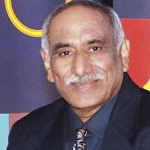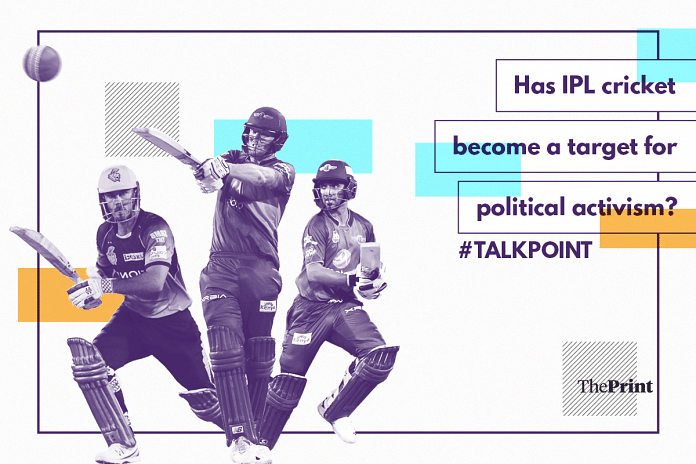The Indian Premier League (IPL) matches scheduled to be held in Chennai have now been moved to Pune after widespread protests over the Cauvery water distribution issue.
Certain political parties and groups have even demanded the cancellation of all matches till a water management board has been formed by the Centre.
ThePrint asks: Has IPL cricket become a target for political activism?
Activists are in the cynical business of catching eyeballs, and IPL helps them reap huge rewards
 Sanjay Dixit
Sanjay Dixit
Former secretary, Rajasthan Cricket Association
It is but obvious that every kind of activism needs a target.
IPL, being as prominent and glamourous as it is, makes the ideal target for political activism. We need to ask a very basic question first: Why do people go into political activism? They are looking for attention. They are looking to grab the extra column space in a newspaper. They haven’t really thought about the right and the wrong of the issue. That kind of moral judgment is not what their business is about.
Even in 2010-2011, when I was the secretary of the Rajasthan Cricket Association, IPL was specifically targeted for all kinds of issues. I conducted two IPLs where the same problems would resurface. Even right now, in Jaipur, the same thing is going on. Every institution whose help is required for the success of the IPL keeps wondering how to harass those organising it.
The issue may be one of social awareness or moral uprightness, but that is not the concern of the political activists. They’re in the cynical business of canvassing eyeballs. And IPL, being IPL, will reap them huge rewards. It a convenient target with easy returns.
Tamil people are not against IPL, they are questioning the insensitivity of the Centre
 Kasthuri Shankar
Kasthuri Shankar
Tamil actor and activist
IPL has never been an apolitical event. It was politicised when the Pakistani and Sri Lankan players were not allowed to play. However, I do not completely agree that there was a need to target the IPL.
But I do understand wanting to share the visibility of the IPL. Any event with the kind of national visibility would have been questioned by the people of Tamil Nadu at a sensitive time like this. It is unfortunate that the first event turned out to be the IPL. DefCon, the next event, is being questioned as well.
Such events give the impression that everything is hunky dory in Tamil Nadu, which it is not. The more pressing demands, for vital needs such as water, and the centre’s contempt of court are lost in the celebration of events like these.
The people of Tamil Nadu feel that the centre has been completely blind to what’s going on in the state. The attitude of making it look like business as usual in Tamil Nadu is unacceptable.
It is not that people are against IPL, they are questioning the timing and insensitivity towards the state.
Everybody has the freedom to protest, but nobody has the right to threaten or force people into solidarity. Cheap threats such as wanting to throw snakes to keep players from participating are uncalled for. The result is that Tamil Nadu has lost the protest, lost face, and lost the IPL.
It would have been a wonderful gesture if the IPL had taken a stand on this matter. Chennai Super Kings and it’s various sponsors have gone to great extents to identify themselves as a Chennai brand, that has now gone to waste.
At the same time, IPL and BCCI have lost a golden opportunity to foster the spirit of social awareness. They have instead exposed themselves as nothing but a commercial venture.
Chennai isn’t against IPL cricket, but is slowly running out of methods of protests
 Manuraj Shunmugasundaram
Manuraj Shunmugasundaram
Advocate & spokesperson, DMK
Cricket is a religion in India, the old saying goes.
There has always been political involvement in cricket and its administration. Given the extent of judicial interest in the maladministration of Indian cricket, of which a large part is the management of Indian Premier League (IPL), there is little doubt of the high regard in which the game is held by the country.
Nevertheless, IPL has attracted more interest and most controversy than any sporting event in our country. IPL is a modern take on a traditional sport and therefore, a symbolic expression of the country as a whole and what we aspire to be. Which is why, after the 2008 Mumbai attacks, no Pakistani players have been picked to play for the IPL teams. It is also why the IPL 2013 games held in Chennai did not have Sri Lankan players, even after they were picked by various teams for that season. So, is political activism in IPL new? No.
In spite of smaller political groups and film personalities asking for a boycott of the IPL matches in Chennai, the first match between Chennai Super Kings and Kolkata Knight Riders took place on 10 April 2018. Since then, the IPL Chairman, Rajiv Shukla announced that the Chennai police have informed him of their inability to provide security for future matches in the city.
The utter incompetence of the present state government to secure the allotted Cauvery water is well known but little did people expect that the city’s police forces will follow the pathetic example of the AIADMK leadership. Even when Cauvery waters have dried up in the past, governments have either held talks or approached the court. This year’s protests seem more against the betrayal of the central government and the indifference of the state government. Bandhs, road rokos, agitations and strikes have been hourly headlines in the last two weeks. #GoBackModi is trending today.
Chennai, always a knowledgeable cricketing crowd, is not against any sport but is slowly running out of methods of protests.
Live coverage on TV and social media by protesting during IPL is just what the activists want
 Norris Pritam
Norris Pritam
Sports columnist and senior freelance journalist
That sports and politics don’t mix is an old adage. But it is as old as the mixing of the two – turning the expression into a mere romantic idea. In fact, the two are wedded.
Right from the inception of the first modern Olympic Games in 1896, the activists and protesters have used the huge gathering of spectators to catch global attention. Fans may have forgotten the American sprint sensation Jim Hines, but Black salute leaders Tommie Smith and John Carlos, protesting White US regime are etched fresh in memory. Same is the case with Moscow Olympic Games in 1980. US-led boycott of the Games is still talked about.
There are numerous other incidents where sporting fields were reduced to political grounds for protest of one kind or another. It is widely believed that China lost the vote for hosting of the 2000 Olympic Games following Tiananmen Square in 1989. It is a never-ending list.
It is in the backdrop of history that one tends to think whether IPL has become a target for political activism? Well, any gathering of crowds whether in a sporting arena or on the street provides the much-wanted captive audience for protesters. And in IPL, technology plays a crucial role. Imagine the attention the shoe-throwing incident caught during IPL. Live coverage on TV and social media is just what the activists want.
It is not the first time that it has happened during IPL. Before Chennai, it was Mumbai in 2016 when IPL matches had to be shifted. Incidentally, lack of water in Maharashtra was the issue then. Water is again the contention.
Sport arenas and popular culture are a place where people can, and should protest
 Talha Ashraf
Talha Ashraf
Journalist, ThePrint
Cricket and cinema are the opium of the masses in India. For protestors, it is a matter of grabbing eyeballs. Unfortunately, the success of a protest is measured by the number of eyeballs it is able to garner. There is nothing that beats the amount of coverage that blocking Indian Premier League games or releases of big films would receive.
IPL is not being targeted unfairly. It will be inappropriate to make this debate just about IPL. Sport arenas and popular culture are a place where people can protest and should protest. Yes, inconvenience is caused to the players and the fans, but the idea of a protest is to cause inconvenience so that people higher up in the hierarchy wake up from slumber.
For BCCI, a cash and resource-rich organisation, this is a small blip. It also announced the new venue for Chennai Super Kings matches within two days.
Two years back, there were similar protests against IPL matches in Maharashtra. The Bombay High Court went a step ahead and directed the BCCI not to hold any IPL match during the month of May in 2016. What did such action achieve in terms of mitigating the drought problem in Maharashtra?
People with legitimate demands should make such big-ticket events their protest venue. But the protests shouldn’t just end with the symbolism.
Compiled by Deeksha Bhardwaj, journalist at ThePrint.



